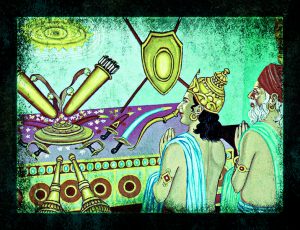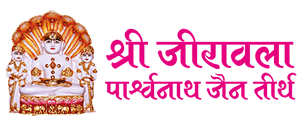
Eighth incarnation as Suvamabahu -2
So advised by the muni, Svamabahu married Padma, like another Padma (Laksmi), with Gandharva rites. Then Ratnavali said to the king, who held a festival, “Always be the sun to the lotus of Padma’s heart.” Just then Ratnavali’s son, Padmottara, a king of Khecaras, came to that place with his wives, bringing gifts, covering the sky with aerial cars. He came to the place and, announced by Ratnavali, after bowing to Svamabahu with hands folded respectfully, he said:
“After learning this story of yours, I have come here to serve you alone, Majesty. So give me your orders, king. Do you, rich in splendor, come to my city on Mt. Vaitadhya. There the Laksmi of the lordship of the Vidyadharas awaits you.”
At his importunity the king assented to his proposal. Padma bowed to her mother and said with sobs: “I shall go with my husband, mother. Henceforth, there is no home for me elsewhere. So tell me. When shall I see you again? Alas! How shall I abandon the trees of the garden like brothers, the young deer like sons, the ascetic-maidens like sisters! Before whom will the peacock display the art of the tandava with a voice pleasing with the sixth note, when the cloud thunders? Without me who will now make the bakulaB, asokaB, and mangoB trees drink water, like sons drinking milk, mother?
Ratnavali said: “Child, you have become the cakravartin’s wife. Then forget, alas! your mode of life resulting from living in the forest. You must now follow your husband, the cakrin, Vasavas on earth. You will be a queen in his abode of joy. Enough of sorrow.” After saying this, kissing her on the head, embracing her ardently, and taking her on her lap, Ratnavali, shedding tears, advised her:
“Child, when you have gone to your husband’s house, always be submissive. Eat, when your husband has eaten, Lie down, when he has lain down. The cakrin’s wife, you must always treat co-wives with courtesy, even though they practice rivalry. For that is suitable for greatness. Your face covered by a veil, your eyes always downcast, child, you should adopt not-seeing-the sun, like a night-blooming lotus. You should practice attendance at your father-in-law’s lotus-feet, like a hansi; by all means do not show pride caused by being the cakrin’s wife. Always consider your husband’s children by co-wives like your own nurslings and have them come to the couch of your lap.”
After drinking the nectar of this speech of advice with the hollows of her ears and after bowing to her, she took leave of her mother and became a follower of her husband. Padmottara, after bowing to Ratnavali, said to the King, “Adorn my aerial car, master.”
Then the king took leave of Gavala and Ratnavali and got into Padmottara’s car with his attendants. Then Padmottara conducted Svamabahu accompanied by Padma to the city Ratnapura, the crown on the head of Vaitadhya. The Khecara gave King Svamabahu a palace made of jewels like a palace of the gods. Obeying orders, standing at his side like a servant of the king, he arranged the usual procedure with bath, food*, et-cetera. Staying there, Svamabahu attained lordship over all the Vidyadharas in the two rows by a great wealth of merit. He married many Vidyadhara-maidens there and was consecrated in lordship over all Vidyadharas by the Vidyadharas. Then accompanied by the Khecaris, Padma and others, whom he had married, Svamabahu went to his own city with his retinue.

The fourteen great jewels gradually appeared to King Suvamabahu ruling the earth properly. Following the path of the cakra, he subdued the six-part orb of the earth with ease, attended even by gods. Sporting with various sports, Vajrabahu’s son remained there, surpassing all brilliance by (his own) brilliance, like the sun.
One day, when he was on top of the palace, he saw with astonishment a group of gods flying up and down in the air. He heard that the Lord of the World, the Tirthanatha, had come and he went to pay homage to him, his mind filled with faith. After paying homage to the Jinendra and sitting down in the proper space, he listened to a sermon from him, which resembled unexpected nectar. After enlightening many souls capable of emancipation, the Blessed One went elsewhere. King Suvamabahu went to his own house.
The king recalled again and again the gods who had come to the Tirthakrt’s sermon, “Where have I seen them before?” and reached remembrance of former births by using uha and apoha. Seeing his former births, he reflected:
“To me striving for Human birth, there is no end to existence by that (human birth). One, who has attained the state of a god, delights in mortal state. What bewilderment is this of the soul whose nature is hidden by karma? A creature goes to heaven, the world of mortals, an animal birth, and hell, lost from the road to emancipation, like a traveler on different roads. Therefore, I shall strive especially for the road to emancipation only. The wealth of self-reliance is the root of every purpose.”
After making this decision, King Svamabahu installed his son on the throne. At that time the Lord Jina, the Lord of the World, came in his wandering. Vajrabahu’s son went to the Tirthanatha’s presence and became a mendicant. Practicing severe penance, he finished his studies in time. By means of some of the sthanas, devotion to the Arhats, et-cetera, being practiced, he, intelligent, gradually acquired the body-making karma of a Tirthakrt. One time in his wandering he went to a great forest, Ksiravana, terrifying from various wild animals, near Mt. Ksira. There, facing the sun, like another sun in brilliance, he continued practicing penance, maintaining firm statuesque posture.

Leave a comment